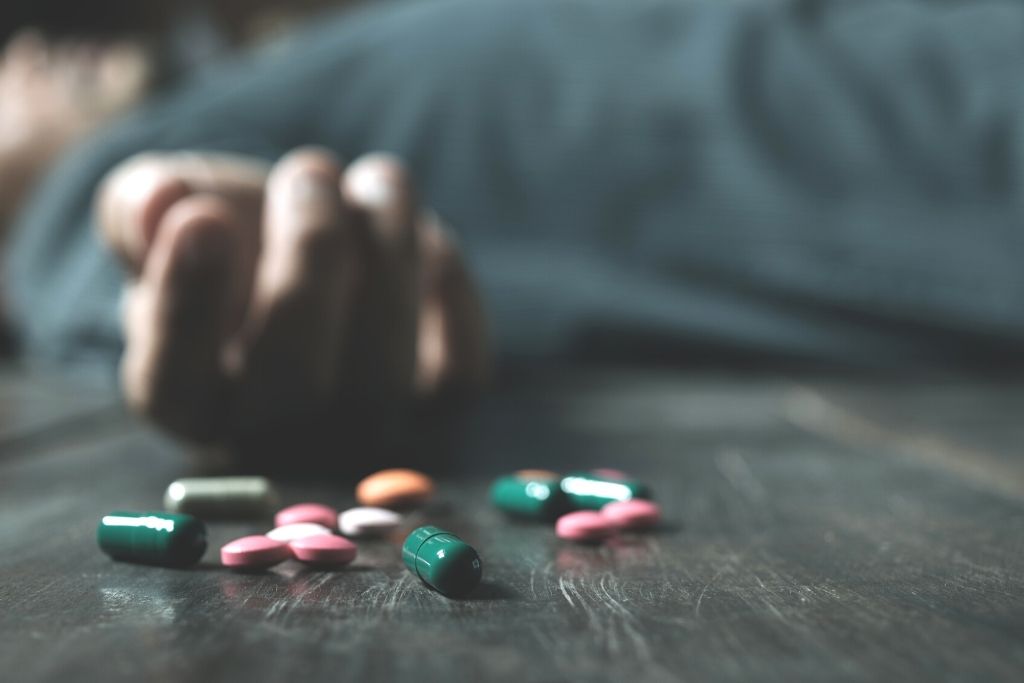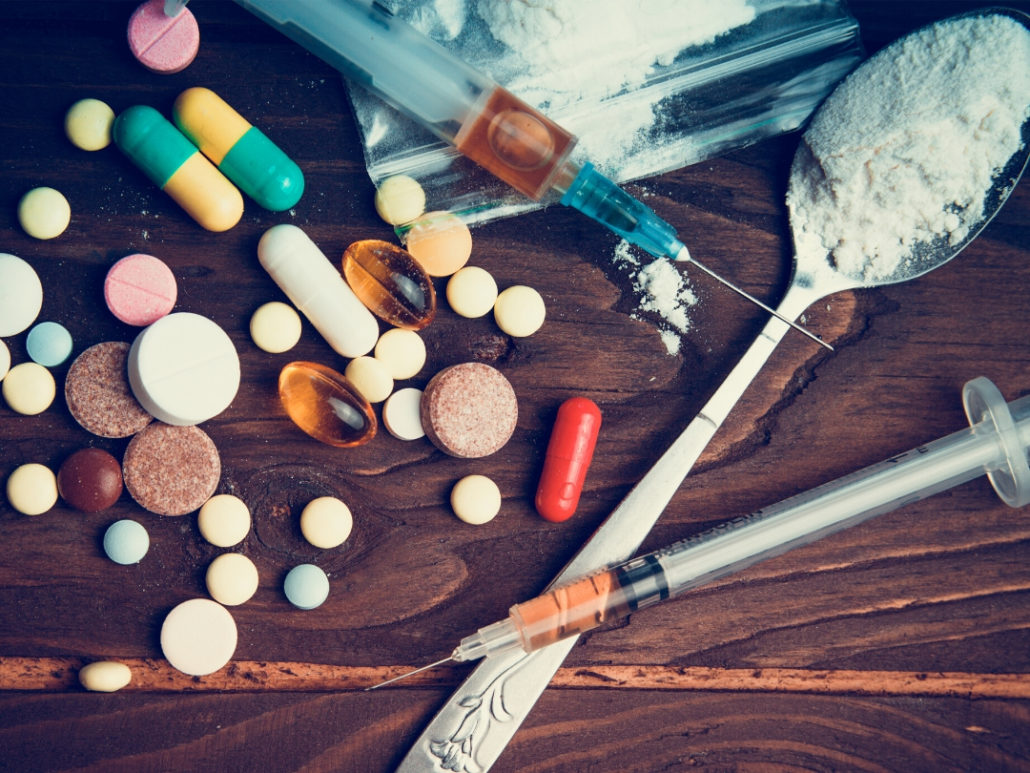What is Polysubstance Abuse?
The use of more than one drug, also known as polysubstance use, is common. This includes when two or more are taken together or within a short time period, either unintentionally or intentionally. Unintentional polysubstance use occurs when a person takes drugs that have been mixed or cut with other substances, like fentanyl, without their knowledge. Physicians are seeing a great number of individuals with addictions to multiple substances, making substance abuse treatment more difficult when the source of overdose deaths is unknown.
Whether intentional or not, mixing drugs is never safe because the effects of combining drugs may be stronger and more unpredictable than one drug alone, and even deadly. The dangers of polysubstance use also apply to prescription drugs. Always let your doctor know what drugs you are taking to prevent any adverse reactions with newly prescribed medications. Never take pills that did not come from a pharmacy and weren’t prescribed to you.
Other people intentionally engage in polysubstance abuse in an effort to experience greater effects from multiple substances. Oftentimes, users may have a preferred substance of abuse that they then combine with other substances at times to enhance the primary substance’s effects. For example, those who regularly abuse opioid drugs, like heroin or prescription painkillers, may sometimes take them with benzodiazepines to experience even greater relaxation or sedative effects. Mixing drugs can also bring unpredictable consequences; this means that those who engage in polysubstance abuse cannot predict the array and severity of negative consequences that could result.


Get Your Life Back
Find Hope & Recovery. Get Safe Comfortable Detox, Addiction Rehab & Mental Health Dual Diagnosis High-Quality Care at the We Level Up Treatment Centers Network.
Hotline (877) 378-4154ICD 10 Polysubstance Abuse
By definition, polysubstance abuse happens when a person consumes two or more drugs, including alcohol, regularly over an extended period. Use can be either simultaneously or separately. Previously, the Diagnostic and Statistical Manual of Mental Disorders (DSM 5) included polysubstance abuse in its listings of mental health problems.
However, the DSM-5 has removed polysubstance dependence as a disorder. Also, the diagnostic terms “dependence” and “abuse” have been centralized and renamed “substance use disorder.”
According to the DSM-5, someone must present at least three of the following symptoms to meet professional criteria defining polysubstance disorder:
- Tolerance for drugs where they need increasingly larger doses of drugs to feel high
- Suffer withdrawal symptoms when they abstain
- Repeatedly trying to stop using drugs with no success.
- Spending most of their time searching for and using multiple drugs
- Experiencing life issues due to using drugs, i.e., losing jobs, getting arrested, failing relationships with family and friends
- Continuing to engage in polysubstance abuse when they know it is harming them physically and mentally
ICD 10 Codes
ICD 10 codes are for billing drug and alcohol-related issues. Drug abuse is a complex, biopsychosocial disease emerging from the interplay of genetics, history of childhood abuse/neglect, environmental factors, and personality traits. Polysubstance abuse disorder also emerges from these variables’ interaction but is reinforced by other drug addiction aspects as a disease.
For example, some people’s brain-body chemistry makes it more challenging to feel high. Consequently, they may find that drinking alcohol while smoking marijuana gives the sensations they crave. Once the brain becomes addicted to the combination of alcohol and pot, the person continues using these two drugs together.
Another scenario may involve an individual addicted to heroin who suffers a severe and painful injury. Unfortunately, the physician prescribing pain medication knows nothing about their patient’s heroin addiction. As a result, the person mixes heroin with pain pills, the intense high cross-addicts them to both heroin and painkillers.
Cross Addiction
Among opioid abusers, polysubstance abuse is “considered the norm instead of the exception.” These three drugs are often cross-addicted with alcohol and cocaine.
- Heroin
- Morphine
- Pain pills
Alternately, amphetamine addicts abuse alcohol and opioids to help them “come down” off a speed high. However, it isn’t unusual for a polysubstance abuser to be addicted to various drugs, especially if they have a strong family history of drug and alcohol disorders and undiagnosed mental or physical illnesses.
Diagnosing Polysubstance Abuse
It can be difficult to diagnose polysubstance abuse if someone is only aware of one substance being used. To be diagnosed with this condition requires meeting certain criteria. First, the person must be using a minimum of three substances. This doesn’t count nicotine or caffeine, which may also be addictive.
Furthermore, the person must exhibit at least three symptoms within 12 months from this list:
- Loss of control – Repeatedly using the drugs more often or in higher frequencies than planned
- Unable to stop using – the person may have failed to cut down or stop using the drugs or have no desire to stop using
- Tolerance – the person requires higher doses to feel any effect, which requires the person to use at least 50 percent more than what they used originally
- Withdrawal – the person has withdrawal symptoms when they don’t use the drugs or they take the drugs to avoid the symptoms
- Interfering with activities – the person stops engaging in activities and interests or cuts down on time spent on other pursuits; this may include work, school, hobbies, and socialization
- Time – more time is spent either obtaining or using drugs and being under the influence
- Self-harm – the person continues using drugs in spite of physical harm it has caused or made worse
It’s important to note that it is possible to have multiple addictions, which is not the same as polysubstance addiction.
For example, a person may be addicted to cocaine, heroin, and alcohol and require more of these specific substances. This is an instance of multiple addictions rather than a polysubstance addiction.
For a case to be a true polysubstance addiction, the person is addicted to the effects of substances, and the particular substance used is a secondary consideration for them. They simply stick with the same three or more substances because of convenience and easy access.
Get Help. Get Better. Get Your Life Back.
Searching for Accredited Drug & Alcohol Rehab Centers Near You? Or Mental Health Support?
Even if you have failed previously, relapsed, or are in a difficult crisis, we stand ready to support you. Our trusted behavioral health specialists will not give up on you. Call us when you feel ready or want someone to speak to about therapy alternatives to change your life. Even if we cannot assist you, we will lead you wherever you can get support. There is no obligation. Call our hotline today.
FREE Addiction Hotline – Call 24/7Why Do People Abuse Multiple Drugs?
Substance use is a significant public health crisis. To complicate matters, many individuals use multiple substances. A study looking at the prevalence and patterns of substances identified factors that increase the risk of polysubstance issues, including:
- Age (younger people have a higher risk)
- Lower levels of education
- Unemployment
- Being White
- Living with a disability
- Anxiety
- Depression and other mood disorders
- Severe tobacco or alcohol use
Genetics, family history of substance use, stress, trauma, and accessibility to drugs are other factors that can contribute to polysubstance use [2].

The Risks of Polysubstance Abuse
Specific short-term and long-term effects related to polysubstance abuse will differ according to the particular combination of substances.
Mixing Stimulants
Examples of stimulants: are ecstasy (MDMA), cocaine, methamphetamines, amphetamines (speed). Stimulants (also known as uppers) can increase your heart rate and blood pressure to dangerous levels and increase your risk of several serious health problems. Combining stimulants may even directly or indirectly increase your risk of:
- Brain injury
- Liver damage
- Heart attack
- Stroke
Signs of use/overdose that may occur when mixing stimulants:
- Fast/troubled breathing
- Increased body temperature
- Nausea or vomiting
- Chest pain
- Seizures or tremors
Mixing Depressants
Examples of depressants: are opioids (heroin, morphine, oxycodone, hydrocodone, fentanyl), and benzodiazepines. Depressants (also known as downers) can slow down your breathing and increase your risk of several adverse health outcomes. Combining depressants can also directly or indirectly increase your risk of:
- Damage to the brain and other organs
- Overdose
- Death
Signs of use/overdose5,6 when mixing depressants:
- Slow breathing
- Weak pulse
- Altered mental status or confusion
- Passing out
Mixing Stimulants and Depressants
Mixing stimulants and depressants don’t balance or cancel them out. In fact, the results of combining drugs are unpredictable, often modifying or even masking the effects of one or both drugs. This may trick you into thinking that the drugs are not affecting you, making it easier to overdose.
Drinking alcohol while using other drugs
Drinking alcohol while using other drugs isn’t safe. Alcohol is a depressant with similar effects to other downers. Mixing alcohol with other drugs can increase your risk of overdose and severe damage to the brain, heart, and other organs.
Comfortable Facilities & Amenities
High-Quality Addiction & Mental Health Rehabilitation Treatment
Rehab Centers TourRenowned Addiction Centers. Serene Private Facilities. Inpatient rehab programs vary.
Addiction Helpline (877) 378-4154Proven recovery success experience, backed by a Team w/ History of:
15+
Years of Unified Experience
100s
5-Star Reviews Across Our Centers
10K
Recovery Success Stories Across Our Network
- Low Patient to Therapist Ratio
- Onsite Medical Detox Center
- Comprehensive Dual-Diagnosis Treatment
- Complimentary Family & Alumni Programs
- Coaching, Recovery & Personal Development Events
Polysubstance Abuse Symptoms
Continued use causes a variety of physical and mental changes as the body adjusts to the presence of these substances. The symptoms produced will vary depending on the type of substance used and how it is administered. Polysubstance abuse can impair one’s ability to think and understand things, leading to a wide range of behavioral changes. The following are some of the most common symptoms of polysubstance addiction:
- Pupils that are constricted or enlarged
- Gain or loss of weight (that occurs unexpectedly)
- Eyes that are bloodshot or hazy
- Engaging in high-risk behavior, such as stealing
- Changing one’s social circle significantly (by associating more with drug users)
As a result, there are certain risks associated with each type of drug abuse. However, when two substances (particularly illicit narcotics) are abused concurrently, the dangers become much more pronounced.
Polysubstance Abuse Effects
A person may mix substances to enhance the effect of a single substance or drug, feel the effects of the substances together, or decrease the effects of a substance. Combining drugs can have serious consequences.
Health Problems
Alcohol and drugs harm the body. Using multiple drugs puts an individual at risk of developing or worsening health issues. The resulting health problems can be short or long-term. Mixing drugs can cause damage to vital organs like the brain and liver, and can lead to health complications such as:
- Stroke
- Heart attack
- Brain injury
- Seizures
Worsening Mental Disorders
In some cases, substance use can lead to mental health symptoms. A person may self-medicate or use drugs to manage their symptoms in other cases. Either way, taking drugs or combining them can worsen mental health symptoms and make them worse. This includes using substances on top of prescription medications for mental health conditions.
Relapse
Relapse prevention is a crucial part of treatment and recovery. Polysubstance use can make it hard for someone to be consistent with treatment. It can also lead to relapse. Relapse is serious and, depending on the situation, can increase the risk of health problems and overdose.
Overdose
The risk of overdosing is higher when using multiple drugs, especially when one of them is an opioid. Depending on the type of drug, the effect on the body can vary. When drugs are taken together, the effects can be intensified. For example, taking more than one depressant drug can increase the risk of overdose or death. According to the CDC, almost half of overdose deaths in the United States in 2019 were related to polysubstance use.
Reclaim Your Life with NJ Based Treatments
There is a strong link between mental health and polysubstance abuse. Individuals who struggle with mood disorders like depression and anxiety are more susceptible to developing an addiction to drugs or alcohol, often to self-medicate symptoms of their underlying mental health condition. These co-occurring disorders can make each other worse without proper treatment.
To determine the most effective ways to treat polysubstance, it’s crucial to first get an accurate assessment of all the symptoms. When the symptoms have been evaluated by a mental health professional, it may be determined that another form of mental condition is present and needs a particular type of treatment. Very often, some combination of psychotherapy, medication, and/or lifestyle changes are effective for coping with functional.
World-class, Accredited, 5-Star Reviewed, Effective Addiction & Mental Health Programs. Complete Behavioral Health Inpatient Rehab, Detox plus Co-occuring Disorders Therapy.
CALL (877) 378-4154End the Addiction Pain. End the Emotional Rollercoaster. Get Your Life Back. Start Drug, Alcohol & Dual Diagnosis Mental Health Treatment Now. Get Free No-obligation Guidance by Substance Abuse Specialists Who Understand Addiction & Mental Health Recovery & Know How to Help.
Detox Treatment in New Jersey Rehab Center
Because polysubstance abuse involves using multiple drugs, the first step in treatment is detoxification. It will help you navigate the complicated withdrawal process, but it doesn’t address patterns of thought and behavior that contribute to drug abuse. Various treatment approaches and settings can help provide the ongoing support necessary to maintain long-term sobriety after you complete detox.
Cravings are very common during detox and can be challenging to overcome. This often leads to relapse. Constant medical care provided during inpatient treatment helps prevent relapse. Clinicians can provide necessary medication and medical expertise to lessen cravings and the effects of withdrawals.
Psychotherapy
Several different modalities of psychotherapy have been used in the treatment of depression including:
- Cognitive Behavioral Therapy (CBT) – is an effective treatment that involves making changes in both the patterns of negative thoughts and the behavioral routines which are affecting the daily life of the depressed person for various forms of depression.
- Dialectical Behavioral Therapy – is a comprehensive mental health and substance abuse treatment program whose ultimate goal is to aid patients in their efforts to build a life worth living. The main goal of DBT is to help a person develop what is referred to as a “clear mind.”
- Person-Centered Therapy – is a strategy that allows and encourages clients to understand and resolve their concerns in a safe, supportive environment.

Dual Diagnosis Treatment Centers New Jersey
Substance abuse and mental health disorders often co-occur. In many cases, traumatic experiences can result in a mental health disorder and substance abuse. Dual diagnosis programs in New Jersey treat both of these issues together. The best approach for the treatment of dual diagnosis is an integrated system. In this strategy, both the substance abuse problem and the mental disorder are treated simultaneously. Regardless of which diagnosis (mental health or substance abuse problem) came first, long-term recovery will depend largely on the treatment for both disorders done by the same team or provider.
Medication-Assisted Treatments
Medication-Assisted Treatments (MAT) for substance use disorders and mental health disorders are commonly used in conjunction with one another. This includes the use of medications and other medical procedures. During your rehab, the staff from your treatment facility will help you identify what caused your addiction and teach you skills that will help you change your behavior patterns and challenge the negative thoughts that led to your addiction. Sometimes, the pressures and problems in your life lead you to rely on substances to help you forget about them momentarily.
If you or a loved one are struggling with long-term polysubstance abuse and a co-occurring mental health condition such as anxiety and depression, contact one of our helpful treatment specialists today. We Level Up rehab center in New Jersey can provide information on dual diagnosis and detox programs that may fit your specific needs.
“My Life Today Is Beyond My Wildest Dreams”, Recovery From Alcohol Addiction & Substance Abuse Video
Addiction Recovery Story and Testimonial Video
“At the end of the day, like when you really think about it, like my life today is beyond my wildest dreams.
Back then, I wasn’t able to even want the life that I have now. I wasn’t even able to dream that up. To dream up the, for the most part, peace of mind, for the most part, being able to show up for my family, to be able to buy a home, to be able to care for my dogs, and to be able to be engaged and be in a healthy relationship. You know, these are all things that I wasn’t even able to realize that I wanted because I was so, you know, either blurred out by alcohol or substances or just stuck in my own head.
So I would say, life beyond my wildest dreams is very much true for me today.”
Does Addiction Rehab Work?
Longer stays in treatment frequently result in better outcomes, however success can vary from person to person. Detox alone is rarely beneficial for long-term recovery. Does treatment work? Attending treatment increases a person’s chances of long-term recovery compared to not attending.
Experience Transformative Recovery at the We Level Up Treatment Center.
See our authentic success stories. Get inspired. Get the help you deserve.



Start a New Life
Begin with a free call to an addiction & behavioral health treatment advisor. Learn more about our dual-diagnosis programs. The We Level Up treatment center network delivers various recovery programs at each treatment facility. Call to learn more.
- Personalized Care
- Caring Accountable Staff
- Comfortable Amenities
- Licensed & Accredited
- Renowned w/ 5-Star Reviews